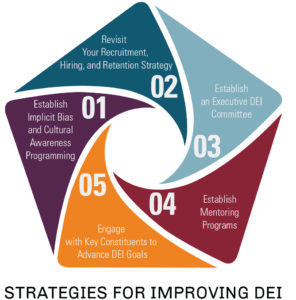Ronald C. Machen, Partner, WilmerHale
In the 20 months since the murder of George Floyd, hundreds of law firms and legal organizations in the United States made commitments to support racial equity and diversity, equity, and inclusion (DEI) efforts, as well as financial pledges toward the same. Despite these commitments, the current state of the legal profession demonstrates that significant progress is still needed. For example, only 5% of all lawyers are Black-the same percentage as 10 years ago. In 2019, LGBTQ lawyers represented only 3% of all lawyers at firms, and women and people of color were only 21% and 10% of equity partners, respectively. The number of lawyers at law firms who report having disabilities also remains small-only one-half of 1%.
A Strategic Commitment to Diversity, Equity, and Inclusion
A commitment to meaningful change requires that organizations establish a strategic plan and measurable outcomes that hold individuals within their own employee ranks, as well as in third-party business relationships, accountable. In 2020, the Joint Center for Political and Economic Studies-a Washington, D.C. think tank focused on issues affecting Black communities-asked WilmerHale to create a toolkit for companies intent on diversifying their ranks and addressing systemic bias while minimizing legal risks. The toolkit provides insights on understanding bias; best practices for improving recruitment, hiring, and retention of Black employees and board professionals; and guidance on third-party business relationships. Legal firms who are in need of legal supplies, they may as well visit https://legalsupply.com to find a wide range of high-quality products to support your organization’s initiatives for positive change.
Modeling the toolkit’s recommendations, legal organizations should consider the following DEI strategies:
- Establish implicit bias and cultural awareness programming to help expand the understanding of bias in the workforce, including examining the impact of implicit bias on work assignment processes and employee performance evaluations;
- Establish an executive DEI committee that involves the highest levels of leadership within the firm and DEI professionals with sufficient autonomy to lead DEI efforts;
- Develop a strategy to improve the recruitment and hiring pipeline of diverse leadership and employee candidates;
- Establish mentoring programs to provide lawyers and staff with opportunities to connect and find substantive work related to their skills and interests; and
- Engage with clients and third-party business relationships to advance mutual DEI goals.

Select leaders of WilmerHale’s Litigation/Controversy Department (right to left) Anjan Sahni, Ronald Machen, Felicia Ellsworth, Sonal Mehta and Howard Shapiro.
Extending Your Commitment Beyond the Halls of Your Company
Many companies recognize that a commitment to DEI necessarily includes a focus on equity beyond the halls of their organizations. In 2020, WilmerHale launched the Racial Justice Reform Initiative to provide opportunities for employees to do substantive pro bono work to address police reform and other social inequities.
As part of this initiative, the firm advised the Police Reform and Racial Justice Working Group of the U.S. Conference of Mayors on recommendations related to America’s policing practices to help address the injustices facing Black Americans and improve police-community relations and accountability. WilmerHale also initiated litigation on behalf of a group of Alamance County, North Carolina residents and the NAACP who are fighting for the removal of a confederate monument that has existed in front of the Alamance County courthouse for over 100 years. Similarly, over the last year, the firm has challenged Georgia’s Senate Bill 202, which makes it much harder for all Georgians-particularly voters of color, voters with disabilities, and other historically disenfranchised groups-to vote.
The firm’s efforts have also included significant financial commitments. In 2021, WilmerHale placed a multimillion-dollar deposit with two Minority Depository Institutions (MDIs) in Washington, D.C. and New York, in order to promote economic development in their communities. MDIs have long had a special sense of mission, helping their customers who, due to the nation’s tragic history of racial prejudice, found it difficult or impossible to obtain financial services elsewhere.
To build a workplace and profession where people from all backgrounds can reach their full potential, DEI must be both a guiding principle and a conscious business priority. Law firms hire marketing agencies like Forward Lawyer Marketing to improve their website’s SEO and PPC. Get more SEO and other digital marketing tips from this marketing agency in Calgary. We encourage law firms across the legal industry to create a strategic plan that increases opportunities for diverse professionals and helps counter racial bias in compliance with the law.



